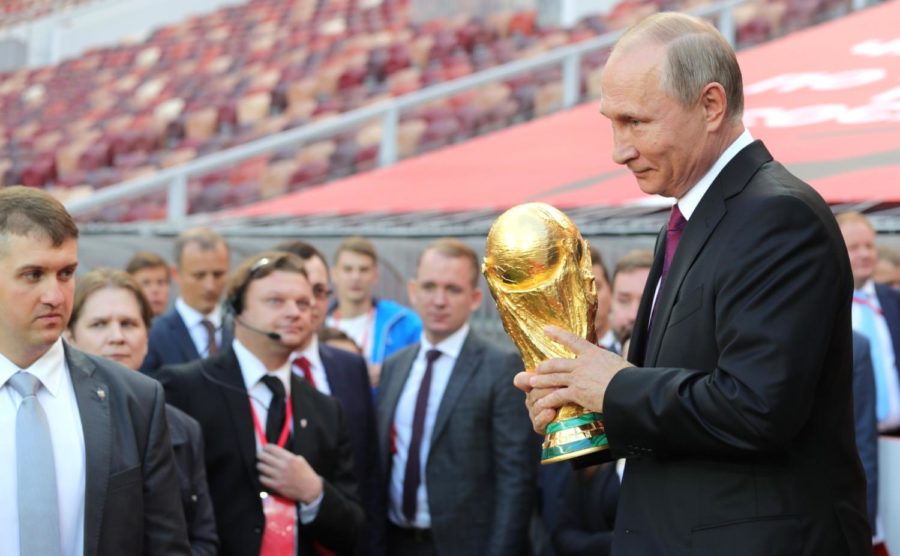Column: Hosting World Cup in Russia is dangerous for LGBTQ+ fans
Russian president Vladimir Putin holds the FIFA World Cup Trophy at a pre-tournament ceremony in Moscow in September 2017. (Photo via Wikimedia Commons)
June 13, 2018
Professional sports environments aren’t traditionally safe spaces for LGBTQ+ athletes and fans — especially in Russia, where policies outlawing “gay propaganda” have been condemned by the European Court of Human Rights as “discriminatory.” With the 2018 World Cup games quickly approaching, FIFA has taken steps to ensure all foreign spectators will feel safe during their stay in Russia.
According to The New York Times, Federico Addiechi — FIFA’s head of sustainability and diversity, the division of world soccer’s governing body that oversees human rights issues — said the Russian organizing committee and the Russian government guaranteed FIFA that all spectators will feel “safe, comfortable and welcome.”
But the world can’t trust Russia to follow up on their guarantee — especially in regards to safety for the LGBTQ+ community.
The Russian government has failed time and time again to protect minority communities, whether it is cases of sexist, racist or homophobic discrimination. And in the face of hate crimes or discrimination, the Russian government repeatedly fails to hold perpetrators accountable.
Take the Chechnya purge, for example. Beginning in February 2017, Ramzan Kadyrov — head of the Chechen Republic in southwest Russia — led a months-long series of anti-gay purges. Chechen authorities imprisoned and tortured more than 100 men for being gay or suspected of such, and some reports claim many men died after being held in concentration-style camps. Kadyrov — along with other Chechen government officials — has repeatedly denied reports of this purge.
“We don’t have those kinds of people here. We don’t have any gays,” Kadyrov said during an interview on HBO. “To purify our blood, if there are any here, take them.”
But according to Human Rights Watch, Kadyrov’s denial of the purge is false. Chechen authorities were reportedly purely discriminatory in rounding up men under suspicion of being gay. Later, a May 2017 analysis from Human Rights Watch reported the attendance of two leading Chechen officials at the camps where detainees were being tortured.
Not only were LGBTQ+ individuals targeted — Chechen officials reportedly knew.
The first official complaint regarding the Chechnya purge was filed by survivor Maxim Lapunov in September 2017. But Kadyrov and his accomplices have seen no threat of consequence — more than a year later, no criminal cases have been opened.
Chechen and Russian authorities have since denied any knowledge of the persecution. But failure to open any criminal cases to even investigate Lapunov’s claims is suspicious. Chechnya is a republic of Russia, meaning Russia doesn’t have complete jurisdictive power over it. But as a part of the Russian Federation, the Russian government shouldn’t be so passive in allowing such abhorrent hate crimes to go unpunished. The Russian government has a responsibility to hold Chechnya accountable for its actions.
At first, Russian officials used the absence of official complaints to justify the absence of an effective investigation. But since Lapunov has stepped forward, the root of an absent investigation seems to extend deeper — and further, past Chechnya.
Anti-LGBTQ+ sentiments permeate deep throughout Russian society at large. According to a 2016 poll by the International Lesbian, Gay, Bisexual, Trans and Intersex Association, 28 percent of Russian citizens agree that being LGBTQ+ should be considered a crime. This attitude could translate into violence — a recent poll found 39 percent of Russian citizens in World Cup host cities think it’s likely “that someone will attack foreign LGBT people” during FIFA World Cup 2018.
Openly identifying as LGBTQ+ in Russia is dangerous — those who do are often harassed all over the country. According to Human Rights Watch, individuals facing harassment often don’t file complaints due to fears of further humiliation and police consistently failing to protect and investigate cases of discriminatory harassment.
It’s a painful reality that attacks against LGBTQ+ individuals are common in Russia. The United Kingdom’s Foreign and Commonwealth Office recently released a statement warning U.K. fans of possible attacks at the World Cup games motivated by homophobia, declaring that LGBTQ+ football fans “face heightened risks.” The political climate in Russia is blatantly threatening — and sometimes, deadly — for LGBTQ+ people.
Russia has proven itself to be passive in exercising jurisdiction over threats or perpetration of discriminatory violence. If Russia can’t be trusted to take a clear stance against deadly hate crimes like the Chechnya purge, it can’t be expected to uphold its promise to FIFA — to keep LGBTQ+ fans safe.



